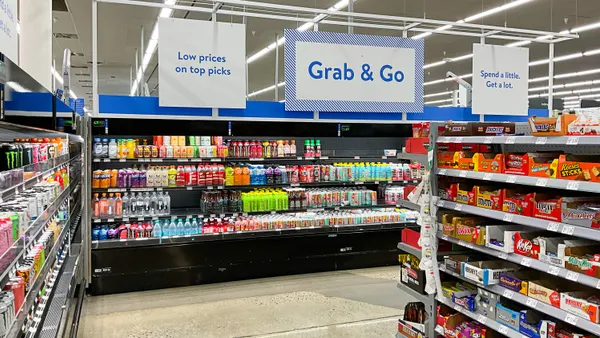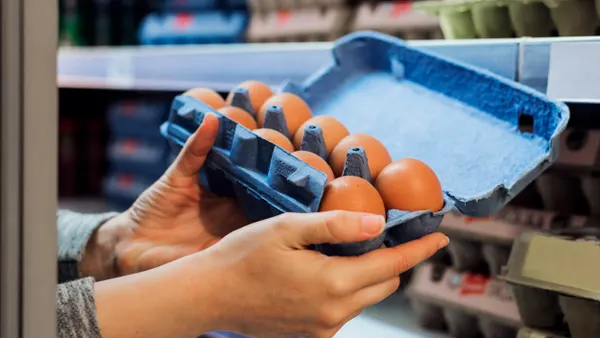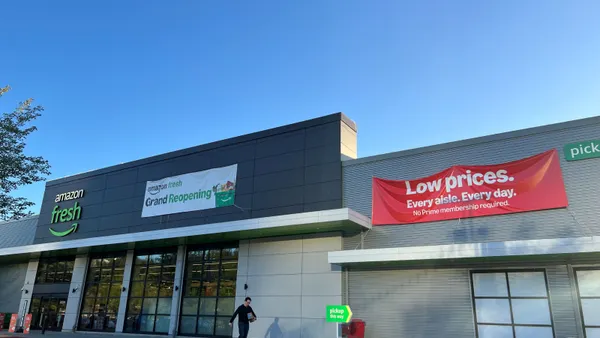Dive Brief:
- Specialty food sales outpaced the growth of all food at retail – up 10.3% vs. 3.1%, according to a new report from the Specialty Food Association.
- Total sales in specialty food reached $147.8 billion in 2018. The report found that growth has slowed as the market matures, with sales rising 4.3% in 2018 compared to 5.4% in the prior year.
- Trendy sectors such as fresh, frozen and plant-based foods continue to lead retail sales. "Diverse consumer lifestyles are taking specialty foods mainstream," Phil Kafarakis, president of the Specialty Food Association, said in a statement. "To reach these consumers and increase their own sales, food merchants have embraced the vast assortment of specialty products."
Dive Insight:
As companies turn to innovation to boost sales, it isn't surprising that the specialty food space is growing.
One of the most prominent segments of growth is in retail. Mintel predicted in the Specialty Food Association report that after growing 7.2% annually, from $47.3 billion in 2013 to $67 billion five years later, specialty foods and beverages will post a compound annual growth rate of 5.9% from 2018 to 2023. Despite the slowdown in growth, the pace remains attractive for food companies desperate to improve their bottom line.
Legacy companies have been trying to expand their reach in this market by launching new products in the category and acquiring small, trendy startups. The plant-based category, for instance, continues to lead the segment. Mintel estimated in the report that the retail market for plant-based specialty items increased 24% from 2016 to 2018. It now accounts for almost 5% of the total specialty category.
As sales grow, more companies are jumping into the crowded plant-based space. Nestlé acquired Sweet Earth in 2017 and recently announced its plan to roll out a plant-based Awesome Burger this fall. But Nestlé isn't the only Big Food company racing to be a leader in the plant-based category. Tyson Foods, which sold its minority stake in Beyond Meat shortly before its recent IPO, announced that it is launching its own meatless products this summer. One-third of specialty food shoppers surveyed said they were buying a plant-based food and beverage, so more companies are bound to invest in this space.
"We're stretched and need to add capacity to supply the growing demand," David Lee, Impossible Foods' chief financial officer, told Food Dive in May. "There is no horizon where I think our growth takes a break. We'll be continuing to expand for some time. We have a long way to go before we're anywhere close to reaching (a saturation) point."
The Specialty Food Association report also showed shoppers continue to move toward healthier and frozen options, with the segments up 16.3% and 12%, respectively, from 2016 to 2018. Many big-name companies have prioritized gaining market share in the better-for-you and frozen sectors as consumers seek out healthier alternatives and convenience.
Since 2015, Hershey has added AmplifySnack Brands, for $1.6 billion; spent $420 million to acquire Pirate Brands, the maker of better-for-you snacks; and purchased Krave's meat snacks and snacking chocolate barkTHINS. PepsiCo continued its pivot away from sugary drinks by adding SodaStream to the fold for $3.2 billion. Conagra also doubled down on its frozen portfolio with its $10.9 billion acquisition of Pinnacle Foods. There are countless other examples where food companies are desperate for growth and turning to these trendy, specialty sectors with M&A.
Michele Buck, Hershey's CEO, said in February that a failure by the maker of Kisses, Reese's and Take5 to grow beyond its signature sweets would amount to "missing an opportunity" to reach more consumers who are changing not only how and where they eat, but turning to better-for-you products when they do.
"Our largest focus for M&A is snacking and really on filling out the places that we don’t currently meet demand,” like better for you and or savory, she told Food Dive on the sidelines of the annual Consumer Analyst Group of New York conference in Florida.
Specialty food consumers spend $214 on all food in an average week and most of that is on groceries, according to the report. Grocery stores have been looking to tap into that growth through specialty food, private label offerings and launching trendy product lines. Last year, the 30-year-old organic retailer Nature's Food Patch finally opened its second location, and big grocery names, from Costco to Kroger, also have invested in more locally sourced and organic ingredients.
Who is the specialty food consumer these companies are chasing? According to the report, millennials are the most likely to make these purchases, followed by Generation X. As millennials' buying power increases, companies have been closely tracking their habits. The generation continues to have a higher tendency to eat out and pick up specialty foods. But this is a shift from last year's report when Gen Z ranked highest in consumers buying specialty foods. Although it is too early to tell whether this will be sustainable going forward, it could be related to the higher cost of some specialty food products, a factor that might hurt sales in the future.













